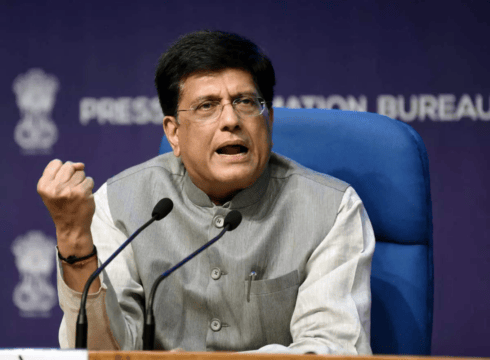The Union Minister of Commerce, Piyush Goyal, is expected to meet top executives of Amazon, Flipkart, Meesho, Shiprocket and Swiggy, among others
The government is looking to understand the business models of these companies and figure out whether they are in compliance with FDI norms
The government earlier sought specific information on seller patterns, private label sales, dark store ownership and discounting and platform algorithms
Inc42 Daily Brief
Stay Ahead With Daily News & Analysis on India’s Tech & Startup Economy
The Ministry of Commerce and Industry has reportedly invited major ecommerce companies operating in India, including online marketplaces, food delivery companies, logistics and quick commerce platforms for consultations on the National Ecommerce Policy.
According to people cited in an ET report, the Union Minister of Commerce and Industry, Piyush Goyal, is expected to meet top executives of Amazon, Flipkart, Meesho, Shiprocket and Swiggy, among others.
According to the officials, the government is looking to understand the business models of these companies and figure out whether they are in compliance with FDI norms. Earlier this year, the Department of Consumer Affairs also sought data from online grocery and quick commerce platforms to understand their business models as well.
The government sought specific information on seller patterns, private label sales, dark store ownership in the case of quick commerce startups and details about discounting and platform algorithms from ecommerce startups.
Quick Commerce Startups On Commerce Ministry Radar
Incidentally, the commerce ministry is also working on concerns over whether quick commerce startups comply with local ecommerce norms. Quick commerce startups typically operate out of dark stores – micro-warehouses operated by third-party entities.
Under draft rules, ecommerce platforms can’t own entities selling products on their platforms, and the government is exploring the ownership of these dark stores.
Further, the Centre is also seeking data on private-label products sold on online grocery platforms to see if companies were pushing in-house brands over other products. It is also looking to ensure that consumers are being offered choices transparently.
Quick commerce, which rose to prominence in early 2022, includes players such as Zomato-owned Blinkit, Swiggy’s Instamart, Zepto and BigBasket’s BBnow.
Business Practices Under Govt Lens
The ecommerce rules, being framed under the Consumer Protection Act, will also look at the business practices of ecommerce players.
Earlier this year, media reports suggested that the government is likely to issue rules which excluded ‘related parties’ of marketplaces such as online retailers and food delivery platforms that would not be allowed to sell products or services to a registered merchant on their platform.
To exemplify, this would mean that Flipkart and Amazon India would not be able to offer their in-house logistics services, Ekart and Amazon Transportation Services, to registered sellers.
Ecommerce players have further attracted attention from the consumer affairs department, as it wrote to major players warning them against the use of ‘dark patterns’ in their user interface. Some of these dark patterns include False Urgency, Subscription Traps, Confirm Shaming, Forced Action, Bait and Switch and Hidden Costs.
Multiple industry bodies, including the Confederation of All India Traders (CAIT), along with a few other national associations, have also been calling for an immediate rollout of the ecommerce policy and the formation of an empowered regulatory authority.
The Department for Promotion of Industry and Internal Trade (DPIIT) started inter-ministerial consultations for the National Ecommerce Policy this June. The government had even floated a draft for the policy in 2019, with the work having started back in 2018, during the first tenure of the Modi government.
{{#name}}{{name}}{{/name}}{{^name}}-{{/name}}
{{#description}}{{description}}...{{/description}}{{^description}}-{{/description}}
Note: We at Inc42 take our ethics very seriously. More information about it can be found here.


